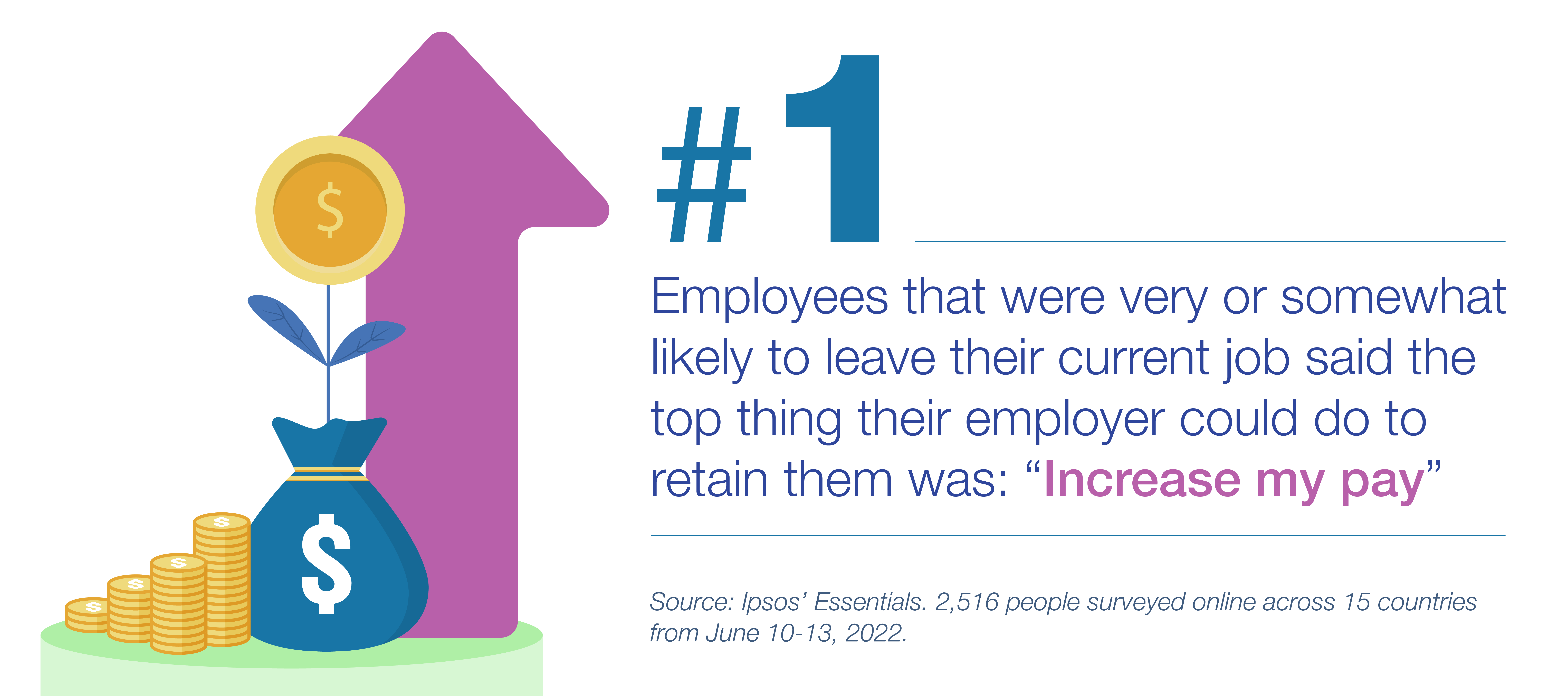Salaries are lagging behind inflation… for now

Gif design: John Jorda
Something’s gotta give.
Many workers have seen the price of everything from carrots to cars skyrocket, but the same often can’t be said for their wages.
Mind the gap
Global Ipsos polling conducted in late May and early June found a minority of people across 28 countries said they were living comfortably, while the vast majority reported struggling financially to various degrees. And most are pessimistic they’ll see relief from high prices this year.
One likely reason the majority are feeling so strapped? Their earning (and thus spending power) has been lagging behind a surging cost of living.
A survey across 15 countries this June for Ipsos Essentials found employees who had no job change reported their annual compensation/hourly wage increase did not keep up with the inflation rate in their country from June 2021-June 2022.
Balancing the books
That inflation-salary gap could become an increasing problem for employers looking to attract and retain top talent in a tight labour market, as Ben Page, CEO of Ipsos, recently warned in our July 2022 Global Inflation Monitor report:
The proportion seeking higher-paid work or asking for a raise from their employer remains comparatively low but if high inflation becomes more than a two-year phenomenon, we expect this to change.
Our online polling via Ipsos’ Global Advisor bears this out.
- Slightly more than one in 10 (12%) employed people, on average, across 28 countries said they’d ask for raise from their current employer if price rises meant they could no longer afford their normal lifestyle.
- While almost two in 10 (18%) said they’d look for higher-paid work with another employer if they continue to feel cash crunched.
That’s the bad news for employers already reeling from people re-evaluating what they want and need out of work in the wake of the scary early days of the COVID-19 pandemic.
The good news?
There are signs inflation may be starting to cool slightly in some countries, though rates are still hovering near historic highs in several places around the world.
Yet even if the cost of living stays relatively high in the months ahead, significantly more employed people said they’d respond by spending less on a range of goods, with asking for a raise or quitting for a higher salary much further down the list of actions they said they’d take.
Breaking up is hard to do
Cutting costs is often fairly easy with immediate results, while earning more money can be much a harder and longer road, pointed out Parijat Chakraborty, Head of Public Affairs in India for Ipsos.
While 24% of Indians* claimed they’d ask for a raise from their current employer and 25% said they’d seek out higher-paid work with another employer if high prices continue, Chakraborty is a bit skeptical.
Indians may ask for inflationary-based raises, he said, but changing employers “is not that easy” and is “generally a long process in India.”
Mari Harris, Knowledge Director of Public Affairs for Ipsos in Sub-Saharan Africa agreed with Chakraborty that getting a raise or a higher-paying job is likely easier said than done for most.
Despite the hurdles, 21% of employed South Africans* said they’d seek higher-paying employment and the same percentage said they’d ask for a raise if further price increases meant they could no longer afford their normal lifestyle.
Money isn’t everything…
For employees who are already have one foot out the door, money clearly talks.
A recent polling for Ipsos Essentials of people across 15 countries found increasing pay was the top way employers could retain workers who said they were very/somewhat likely to quit their current job.

Both Chakraborty and Harris said people with in-demand skills will likely be able to get a salary bump from their current employer or find a higher paying job with another organization.
For those without highly sought-after skills who might be feeling financially squeezed, there are other ways employers can make them feel valued, noted Harris.
Addressing employee well-being issues, from work-life balance to mental health, often costs employers much less than permanent salary hikes, she pointed out.
And Chakraborty added one-time attraction and retention bonuses are also a cost-effective way for employers to help employees shoulder the burden of these shaky economic times.
Other perks, such as offering workers more say over when and where they work is also an essentially free way to give workers the flexibility many want, noted Harris.
If inflation doesn’t ease off significantly soon, employers likely gotta give employees more cold, hard cash. But that’s not all.
“I think there's always other ways to make people happy as well — not just money,” said Harris. “So, I think it's probably something for employers to look at: what else can they do, either in the sense of benefits or other perks?”
*The survey was conducted in Argentina, Australia, Belgium, Brazil, Canada, Chile, Colombia, Denmark, France, Germany, Great Britain, India, Italy, Japan, Malaysia, Mexico, the Netherlands, Peru, Poland, South Africa, South Korea, Saudi Arabia, Spain, Sweden, Turkey and the United States. The samples in Australia, Belgium, Canada, Denmark, France, Germany, Great Britain, Italy, Japan, the Netherlands, Poland, Spain, Sweden and United States can be taken as representative of their general adult population under the age of 75. The sample in other countries produces a national sample that is more urban and educated, and with higher incomes than their fellow citizens.
